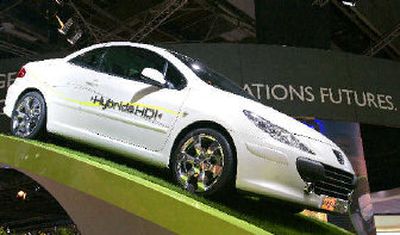Small cars dominate show

PARIS — Smaller is better at the Paris Motor Show, at least for automakers looking to exploit consumer disgust with higher gas prices.
It’s a mantra that’s been heard before when energy prices have risen. But for automakers around the globe, the idea of smaller cars that use less fuel yet retain the spirit of the traditional sport utility vehicle is taking root.
“Of new or redesigned products at the show, fully five were smaller SUVs or crossovers aimed at the growing European market for this kind of vehicle,” said Stephen B. Cheetham, a European auto analyst with Sanford C. Bernstein Ltd. in London.
Most of the major automakers showed off high-end sedans and sport-inspired models, including the DaimlerChrysler SLR McLaren 722 Edition — but smaller models proved top draws at the media preview ahead of Saturday’s official opening.
With gas prices well above a year ago, automakers are trying to respond to consumer concerns about fuel costs and environmental effects, without driving away customers for their traditional offerings.
Europe has generally been a small-car mecca, said analyst Rebecca Lindland of Global Insight, where the “small streets, the need for fuel efficiency, make them good sellers.” All automakers with any presence in Europe, from France’s Citroen SA to Volkswagen AG’s Skoda subsidiary, offer plenty of small, fuel-efficient cars.
Smaller cars are also attracting more buyers in the U.S. — about 378,000 subcompacts are expected to be sold this year, up from 223,000 last year — causing headaches for carmakers who were too reliant on trucks and SUVs. Even so, the Chevy Trailblazer alone sold 250,000, Lindland said. “We are still very much a truck-loving nation.”
That spirit has also been catching on in Europe, despite reservations in a culture that has long favored pollution controls and frowns on too much excess.
Nissan Motor Co. is hoping that its Qashqai can break through those concerns.
The Japanese automaker bills it as compact that has the feel but not the aggressiveness of a SUV. It boasts large wheel wells and sits higher off the ground, but drives like a solid and small sedan.
Like Nissan, Hyundai Corp. has its popular Santa Fe SUV, but unveiled a new version, that was more upscale yet still not too large. Dubbed the Veracruz, it sports a 3,000 cubic-centimeter V6 diesel engine and is aimed chiefly at taking away buyers who would tend to go for a Lexus or Mitsubishi.
In a bid to gain more credibility with buyers, automakers pulled out the stops in alternatives to gas-powered cars, exhibiting new ways to market hybrids, which typically use something other than gasoline — diesel, ethanol, hydrogen, electricity — at least some of the time.
Citroen, Peugeot, Saab and Lexus showed off hybrid technology, which aims to make cars easier to drive and less costly both in terms of fuel costs and pollution.
Toyota Motor Corp. manager Colin Hensley said the Prius has seen its sales steadily increase, with 720,000 sold since it hit the market in 1997.
“In the first six months of this year, 135,000 customers bought them,” he said. “By 2010, we will sell a million hybrids.”
Automakers have taken note of that demand. The Lexus LS600H is a luxury car with a hybrid engine, while Citroen SA showed off its diesel concept car, the Coupe C-Metisse. Peugeot drew plaudits for its gas-cell powered 207 Coupe Cabrio concept.
Swedish automaker Saab had its 9.3 Cabriolet on display, which can be powered with pure ethanol feeding the 260 horsepower engine and zero exhaust emissions.
BMW Chief Executive Norbert Reithofer said his company was looking at entering the market, but didn’t give any details.
In Brussels on Friday, the energy companies Shell Hydrogen BV and Total France, along with BMW, DaimlerChrysler AG, Ford Motor Co., Volkswagen AG, General Motors Europe AG and MAN AG, announced a joint project to advance the use of hydrogen as fuel for trucks in Europe.
“Hydrogen and fuel cell technology will bring significant change in the way Europe produces and uses energy,” the companies said in a statement.